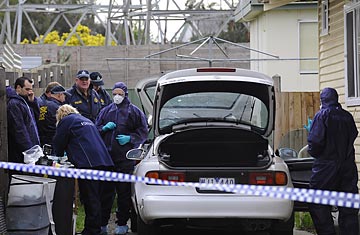
Forensic police investigate a house in Melbourne
Most Australians know very little about Somalia and even less about the al-Shabaab group that has been fighting for control of the war-torn African nation since 2006. But on Tuesday, Aug. 4, they quickly began to learn the pronunciation of the Somali terrorist group's name. Just before dawn, approximately 400 police from state and federal departments fanned out across Melbourne and its southwest, raiding 19 properties and arresting four men and questioning others. The police claim they had foiled a suicide plot by Al-Shabaab supporters to storm a Sydney military base and kill as many soldiers as possible.
For seven months, Australian police and undercover security agents had been tracking the suspects, gathering information on them by way of phone taps and other forms of surveillance. Those arrested appear to be Australian citizens of Somali or Lebanese descent. An estimated 16,000 Somalis have found refuge in Australia since the beginning of their country's civil war 17 years ago. "Potentially this would have been, if it had been able to be carried out, the most serious terrorist attack on Australian soil," Federal Police Assistant Commissioner Tony Negus said. The alleged plan was to attack Holsworthy Army Barracks in Sydney's southwest.
The plan apparently included sending Australian citizens to Somalia to participate in the civil war. There al-Shabaab, which means "the youth," has been fighting to impose Shari'a (religious) law on the country. The group controls most of the southern part of Somalia and has been making growing inroads into the capital, Mogadishu.
Meanwhile, the members of the group, said Negus, were "actively seeking a fatwa or religious ruling to justify the plan to conduct a terrorist attack within Australia." Australia has no troops in Somalia, but it has a frigate as part of a multinational naval armada protecting shipping from Somali pirates off the Horn of Africa. Reports have also been circulating of a connection with al-Shabaab sympathizers in Minnesota, where a Somali immigrant to the U.S. last week pleaded guilty to traveling to Somalia to collaborate with al-Shabaab. Asked if the U.S. had anything to do with the Australian crackdown, Special Agent E. K. Wilson of the FBI's Minneapolis office would not comment on the Melbourne operations, simply saying, "We have very good relations and cooperation with Australian law enforcement on counterterrorism issues."
On Tuesday, one of the four men arrested in Melbourne was charged with planning a terrorist attack. During the court hearing, local newspapers reported, the man remained seated throughout the proceedings, not rising for the judge or for questioning, explaining through his lawyer that he would stand only before his God. On Wednesday, Aug. 5, four more men were charged. At their hearing, one reportedly responded by saying, "You send troops to Iraq to kill innocent people ... You call me a terrorist. I never killed a person in my life. Your army kills innocent people in Iraq and Afghanistan. Israel takes Palestinian land by force."
Just hours after the raids, Australian Prime Minister Kevin Rudd declared, "There is an enduring threat of terrorism at home here in Australia as well as overseas." He noted that three Australians lost their lives in the recent bombings in Jakarta but was quick to note that the alleged al-Shabaab plot appears to have nothing to do with the Indonesian incident. Despite Australia's remote location, a number of major investigations have been mounted into alleged terrorist cells or terrorist supporters, with mixed success. In 2005, Australian security agencies thwarted a group of men who had discussed plotting to bomb prominent sporting venues and a casino. The investigation led to the conviction of seven men in Melbourne last year.
Rudd said the incident emanated "from a small number of individuals who should in no way be taken as a wider reflection of any group within Australian society." A number of critics, however, say the so-called plot illustrates a failure to integrate immigrants like the Somalis into Australian society. Dr. Berhan Ahmed, chairman of the Melbourne-based African Think Tank, an organization dedicated to assisting African refugees, says outdated policies are responsible for migrants' struggling in Australian society. Unemployment remains a huge problem. Ahmed also cites the practice of putting refugees into troubled government-owned housing complexes or high-rise apartment blocks "where often the drug dealers are who want to recruit the kids." Instead, parents push the kids toward religious figures, including some who preach extremist views. Says Ahmed: "What would you do for your son or daughter? Would you leave them to drug dealers?"
— With reporting by Bobby Ghosh / Washington
